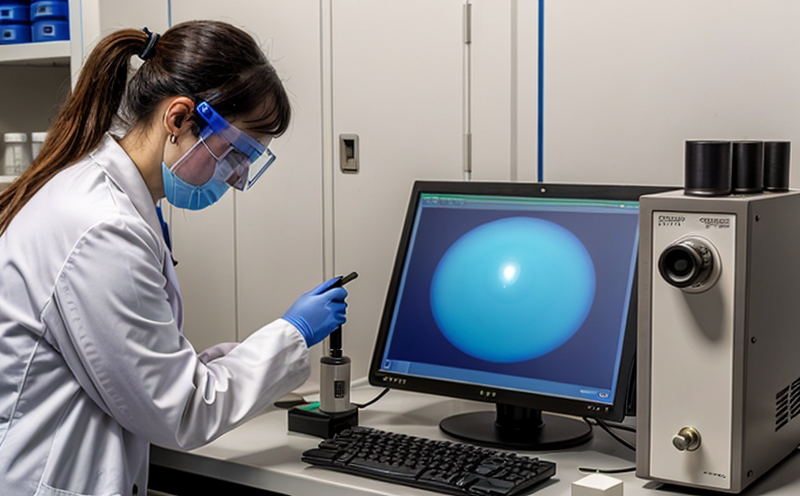GB T 25993 Fuel Cell Spectroscopic Testing
The GB/T 25993 standard specifies a comprehensive set of methods for spectroscopic analysis used in evaluating the performance and quality of fuel cells. This testing protocol is particularly vital for ensuring that fuel cells meet stringent environmental, safety, and performance criteria as per international standards such as ISO/IEC and ASTM.
Fuel cells have become an essential component in the energy sector due to their high efficiency and low emissions. GB/T 25993 spectroscopic testing is a critical step in the quality assurance process for fuel cell manufacturers, ensuring that each unit produced adheres to strict specifications. The test involves several stages, including sample preparation, instrument calibration, data acquisition, and interpretation.
Sample preparation is crucial as it directly affects the accuracy of the analysis results. Typically, this includes cleaning the sample, drying it in a controlled environment, and ensuring that any contaminants are minimized or removed. Calibration of the spectroscopic equipment ensures consistent and accurate measurements across different samples. Once calibrated, the instrument captures spectral data which is then analyzed to determine key performance indicators such as fuel cell efficiency, durability, and safety.
The primary goal of GB/T 25993 testing is not only to ensure compliance with regulatory standards but also to provide insights into potential areas for improvement in the design and manufacturing process. By identifying deviations from expected values early in the production cycle, manufacturers can make necessary adjustments, leading to enhanced product quality.
Another significant aspect of GB/T 25993 testing is its role in supporting research and development activities within organizations involved with fuel cell technology. Through continuous monitoring and evaluation, researchers gain valuable feedback on how changes in materials or design affect overall performance. This information can be used to drive innovation and improve future generations of fuel cells.
It's important to note that GB/T 25993 testing goes beyond just meeting legal requirements; it plays a pivotal role in advancing the technology itself. As standards evolve, so too do the methods employed during these tests, ensuring that the industry remains at the forefront of technological advancement.
In summary, GB/T 25993 fuel cell spectroscopic testing is essential for maintaining high-quality standards across all stages of production and development processes related to this important renewable energy source. By adhering strictly to this protocol, manufacturers can ensure they produce reliable products that not only meet current regulatory expectations but also contribute positively towards sustainable practices.
Why It Matters
The importance of GB/T 25993 fuel cell spectroscopic testing cannot be overstated. This type of analysis provides critical insights into the composition and performance characteristics of fuel cells, which are key determinants of their efficiency and longevity.
- Performance Optimization: By regularly monitoring the chemical makeup of fuel cells through spectroscopy, manufacturers can identify any discrepancies or inconsistencies that may indicate potential issues in the manufacturing process. These findings allow for timely adjustments to improve overall performance.
- Safety Assurance: Ensuring compliance with relevant safety standards is paramount when dealing with technologies like fuel cells. GB/T 25993 testing helps detect hazards early on, providing assurance that these devices are safe for use under intended conditions.
- R&D Insights: Spectroscopic analysis offers valuable data points that can guide further research and development efforts aimed at enhancing the capabilities of existing fuel cells or developing new designs altogether.
In essence, GB/T 25993 testing serves multiple purposes – it ensures quality control, enhances safety measures, and fuels innovation. Its significance extends beyond mere compliance; it contributes to creating more efficient, safer, and sustainable energy solutions for today’s demands and tomorrow's needs.
Eurolab Advantages
At Eurolab, we pride ourselves on delivering top-notch spectroscopic testing services that align perfectly with the requirements set forth by GB/T 25993. Our team of experts employs state-of-the-art equipment and follows stringent protocols to ensure accurate results every time.
- Precision Calibration: All instruments used in our facility undergo regular calibration checks, guaranteeing precise measurements that meet or exceed industry standards.
- Experienced Technicians: Our staff comprises highly trained professionals who possess deep expertise in spectroscopy and related fields. They stay updated with the latest trends and techniques ensuring that you receive cutting-edge testing services.
- Comprehensive Reporting: Beyond just providing numerical outputs, our reports offer detailed explanations of what each result means for your product or project. This helps stakeholders make informed decisions based on reliable information.
We understand that every client has unique needs, which is why we customize our services to suit individual requirements. Whether you need routine checks or one-off assessments, Eurolab stands ready to deliver exceptional results consistently.
Environmental and Sustainability Contributions
The use of GB/T 25993 fuel cell spectroscopic testing contributes significantly to environmental sustainability efforts by promoting cleaner energy solutions. Fuel cells represent a promising alternative to traditional fossil fuels because they produce electricity through electrochemical reactions rather than combustion processes, thus emitting minimal greenhouse gases.
- Reduced Carbon Footprint: By improving the efficiency of fuel cells, we help reduce the amount of carbon dioxide released into the atmosphere. Efficient fuel cells mean less reliance on non-renewable resources and lower overall emissions profiles for end-users.
- Resource Optimization: Through precise spectroscopic analysis, manufacturers can optimize their use of raw materials, reducing waste and minimizing negative impacts on natural ecosystems.
In addition to direct environmental benefits, GB/T 25993 testing supports broader sustainability goals by encouraging industry leaders to adopt best practices that promote long-term viability. As standards evolve, so too do the methodologies employed during these tests, fostering continuous improvement and adaptation within the sector.
At Eurolab, we are committed to playing our part in driving this transition towards greener technologies. Our commitment extends beyond compliance; it includes actively participating in discussions about future directions for sustainable development initiatives worldwide.





